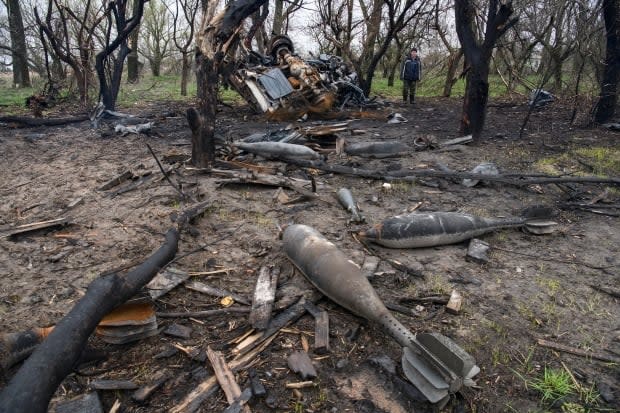Ukrainian environmentalists tracking possible Russian eco crimes

Russia's invasion of Ukraine has shattered millions of lives, but environmental activists also worry the ecological damage to their country will be irreversible.
"It's actually a huge risk for the whole world," said Evgenia Zasiadko who heads up the environmental crimes team at Kyiv-based EcoAction, a non-governmental organization that pushes for green policy in Ukraine.
Zasiadko has escaped Ukraine, finding a route from Kharkiv to safety in a country she is not disclosing due to security concerns after enduring days of heavy shelling and airstrikes.
She's keeping watch from a distance, determined to hold Russia accountable for environmental damage in Ukraine.
From her temporary home, she and a network of 15 scattered across Eastern Europe are keeping close tabs on what they say are environmental crimes committed by Russia, which they are defining as anything that causes serious pollution and harm to the ecosystem and people.
So far they've logged 144 alleged environmental crimes using open-source intelligence, verified video and witness reports. Zasiadko says in Eastern Ukraine she expects there are many more incidents not yet on their radar.

For example, Zasiadko pointed to numerous videos and pictures collected by the investigators of fuel repositories belching black plumes of smoke into the air after allegedly being hit by missiles or set on fire.
"It's damage to industrial buildings. It's energy safety and nuclear safety. It's damage to ecosystems and damage to the marine ecosystem because there have been a few ships that have been bombed," she said.
Contamination can last decades
Propellants, explosives and heavy metals used in weapons contain many contaminants including some carcinogenic compounds which can scatter in the air and leach into soil and water with serious environmental impacts, according to a report from Defence Research and Development Canada.
"We collect the numbers of tanks, the numbers of bombs and everything that is coming to Ukraine from military actions," she said.
The sheer number of possible military contaminants and environmental repercussions is another one of the reasons Zasiadko says Ukraine needs the war to end as quickly as possible, and not just for her country's sake but for neighbouring Russia as well.
"Do they have enough understanding what kind of harm it could bring not only to Ukraine, but to Russia also?" she said.
Zasiadko fears the environmental impacts of the war will displace a second wave of refugees in Ukraine due to contaminated soil and water.
"The territory would not be possible to live, to use their water, to grow any plants or vegetables because it would be a high risk for their health in the long term," she said.
Soil contamination from munitions can persist for decades, according to the Food and Agriculture Organization of the United Nations. Little published information exists because of restrictions on military information, the organization notes, but it has been documented in parts of Scotland and Germany.
Images from the Luhansk Regional State Administration, of an alleged Russian strike on an oil depot, school, and houses on March 30 and 31:
Few precedents
Even if EcoAction has the evidence, it would be hard to hold Russia to account, said Doug Weir, research and policy director of the Conflict and Environment Observatory.
"There are very few precedents where states have been held accountable for environmental damage caused and conflict," Weir said from his home in West Yorkshire, England.
"The most famous one is the UN Compensation Commission, which was established after the 1991 Gulf War, but circumstances were quite unusual and quite specific in that Iraq had caused a lot of damage by setting fire to oil wells in Kuwait."
The UN Security Council set up a compensation claims commission, of which environmental claims were one small part, Weir said. The UN was able to enforce some compensation because Iraq wasn't on the Security Council and didn't have veto power.
"Could you replicate something like that in the case of Ukraine at the moment? Probably not through the same pathway with Russia as a permanent member of the Security Council with veto power," said Weir.

"But there are other potential avenues for setting up an independent tribunal, which would probably look at reparations across a whole range of damage that have been caused by Russia."
Weir worries some of the damage from the toxicity of weapons in Ukraine could be permanent but he's also concerned about what they could be unleashing when they hit their targets.
"Maybe substances like asbestos … and all of this ground up into particulate matter, which we know the PM2.5 [fine particulate matter] for example, is very bad for public health," he said.
"We know that there are potentially a lot of environmental contaminants which could be affecting people in these areas."
'War makes global warming worse'
At the Balsillie School of International Affairs in Waterloo, Ont., PhD candidate Tamara Lorincz worries about the impacts of Canada's contribution to the conflict, including the munitions it has provided to Ukraine.
"All of the weapons that Canada is sending to Ukraine have adverse environmental impacts," she said.
There is also the carbon footprint of war machines to consider, Lorincz said.
"Fighter jets, warships, tanks, consume an exorbitant amount of petroleum products and release carbon emissions into the atmosphere," she said. "War makes global warming worse."

Military emissions are excluded from most national greenhouse reduction plans, Lorincz said.
"They're huge, heavy vehicles that have very limited range. And they are energy inefficient. They consume excessive amounts of diesel. And again, they contaminate the soil and they release carbon emissions that make climate change worse," she said.
In a statement to CBC News, the Department of National Defence says it is "working on transitioning to net-zero carbon and climate-resilient operations, while also reducing environmental impacts beyond carbon, including on waste, water and biodiversity."
It says it has reduced greenhouse gas emissions by 38 per cent compared to 2005 levels through its Defence Energy and Environment Strategy — but that figure does not include the military's "national safety and security fleets," among them large emitters such as aircraft and vessels.

Rather than supply weapons to Ukraine, Lorincz would rather see Canada help monitor the ecological fallout of the war and rebuild.
"Ensure that post-conflict reconstruction and recovery is done in an environmentally and green way. So, you know, we could be working with Ukraine, for instance, afterwards to rebuild it with green principles in mind and in an energy efficient way," she said.
Lorincz believes the conflict couldn't have come at a worse time for the environment and has put international cooperation on climate change in peril.
"We need to cooperate with all countries like Russia and China on dealing with global warming and war undermines our ability to work well with other countries," she said, noting that Russia itself is in the throes of a serious climate crisis with forest fires, drought and extreme heat waves.
"I'm very concerned that this Russian invasion in Ukraine, this ongoing war, is going to increase tensions among countries and make it more difficult for us to to cooperate and come to global solutions that we need on dealing with the climate crisis."


